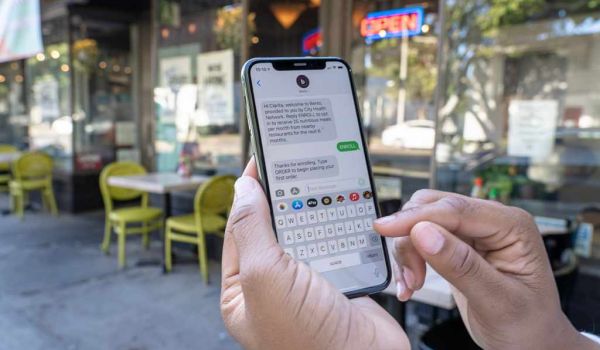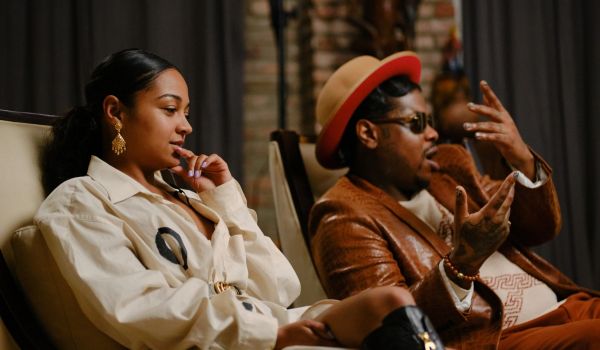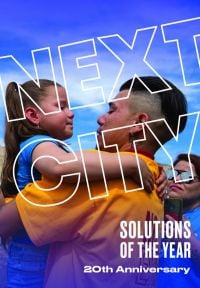EDITOR’S NOTE: This sponsored content is paid for by the Center for Cultural Innovation (CCI), as part of its AmbitioUS initiative. This series explores how alternative economic models can empower artists and culture bearers, with an eye toward financial freedom and long-term sustainability.
Remember the internet in 1998? Only 9% of households had internet access, and many people were still deeply skeptical that it would become mainstream. Regardless, some of the most powerful companies in the world — from Google to Amazon — were coming online.
People now describe that era as the birth of Web 1.0 – a digital place where you could consume content. That soon birthed Web 2.0 – a space where you could create content through blogging, social media and more. Now, we’re in the throughs of the Web 3.0 boom, where through decentralizing data, creators are able to monetize their content.
Furthermore, some experts say we’re at a similar pivotal moment with Web 3.0, also called Web3 now that we were with Web1 in 1998. Startups are springing up at staggering speeds, hoping the blockchain, the public ledger that supports Bitcoin and other crypto-currencies, will solve all sorts of problems for businesses and consumers. However, that raises the crucial question: Who will get to define and shape Web3, and will they do so in an equitable way or make a money grab?
“Blockchain could be the capital system that’s going to liberate ourselves from our data,” says Cate Fox, director of the Center for Cultural Innovation’s AmbitioUS initiative, an investment program created to help increase economic self-determination opportunities for BIPOC cultural communities and artists. “But it’s not going to liberate us if the right people aren’t getting a seat at the table.”
Web3 has the potential to solve two crucial problems — copyright and payment — for those who are the focus of the AmbitioUS initiative: artists and creatives. However, the hurdles for that population loom large.
The Web3 Education Gap
As an artist, Session Cruz sees an inextricable link between what he calls twin problems: fair payment and copyright control. Cruz is working to help solve both. His most recent professional experience was in influencer marketing for high-profile musicians like Snoop Dog and Meek Mill. When COVID-19 slowed that industry down, he had an “aha moment” about what Web3 would make possible and began spending all of his spare time learning Bitcoin.
The outcome was Demu, an open protocol for royalty payouts and other financial services for the music industry. When app developers build a music streaming platform on top of the protocol, anyone who has a right to royalties from a song will receive an automatic payout to their personal wallet anytime that song is played. This is done through embedding and tracking the song’s metadata. While it may sound small, it’s actually one of the biggest problems today for record labels and artists. According to a Verge article from 2019, missing, bad or inconsistent song metadata has left billions on the table that never gets paid to the artists who earned that money.
DEMU also has the potential to reduce the time it takes for rights holders to receive their royalties from months to just minutes, as well as give majority rights holders more control over their intellectual property. Record labels themselves can also build on top of the protocol to become their own music merchant — think Disney rolling out its Disney+ streaming service.
“The ability to own that breadcrumb of data that you leave behind in Web2, it’s yours now in Web3 and you’re allowed to monetize it in any way that you see fit,” Cruz says. “There is intrinsic value in Web3, but it needs to be built.”
Cruz gets fired up when talking about the potential of Web3, but his enthusiasm isn’t always as infectious as he hopes. Often, the comprehension gap around Web3 is too great for record labels and artist managers to get on board.
“It’s super hard to have to constantly explain what Web3, blockchain and crypto mean,” Cruz says. “It’s hard to get people on board when you constantly have to go to the basics.”
Cruz’s struggle around education is a familiar one for many trying to get support and funding for Web3 projects.
Austin Robey, an expert in collective internet culture, shared ownership and new models for the online creative economy, bumped up against that same problem with the musician cooperative platform Ampled, which he helped form in 2018. Early last year, he and other Ampled leaders explored implementing an Ethereum-based community token that could serve as a kind of time bank to measure contributions to the collective, rather than as an exchange of money.
Their enthusiasm wasn’t shared widely enough with the cooperative members for the idea to take root.
“There were too few advocates that deeply understood Web3 that could educate everybody else,” Robey says. “The ongoing education was a lot to sign up for. [Ampled board member] Nicole d’Avis and I had to take a sober pulse of the community, and it wasn’t something that people are saying ‘hell yes’ to at the moment. It just didn’t feel like the right time.”
The education gap is an issue AmbitioUS knows all too well. As an organization, AmbitioUS has been trying to learn about the potential of Bitcoin and Web3 — and how it can support startups led by BIPOC creatives within the space — for a number of years. While it hasn’t been easy, the program leaders see it as essential.
“We’re trying to learn on the behalf of groups of artists who we hope won’t get left behind or get marginalized or even get completely excluded,” Fox says. “This is a shaping moment, and the more that we can learn the better equipped we are to support the folks that historically have been excluded from other systems.”
At Web3 conferences, AmbitioUS often finds it’s one of the only philanthropic organizations present. Fox understands how intimidating it can be — she describes figuring out how to buy crypto as an organization as a “total nightmare” — but says it’s crucial for foundations and mission-driven lenders to get on board and start educating themselves, and soon.
“If you say you are in it for systems change work and you aren’t going to these conferences and aren’t actively exploring this space, then I don’t know how you can accurately say you’re in it for systems change,” Fox says. “Because this is the future of systems.”

(Image courtesy of Unnamed Fund)
Cutting Through Red Tape
Many creatives aren’t waiting for grants or VC support to build Web3-based platforms and organizations. Blockchain enthusiasts such as Robey believe that Web3 provides an opportunity to rethink organizational systems, the flow of capital and the possibilities of collective control of platforms.
Robey’s newest venture, a mutual aid collective organizing as a DAO (decentralized autonomous organization) called Unnamed Fund, is built around that idea. Born out of a group of artists who met each other through NEW INC, the incubator of the New Museum in New York City, the community-led and -owned fund created a multi-signature crypto wallet and democratic voting process to collect and distribute funds.
Members submit funding requests, which range from support for an art project and for the “life stuff” that gets in the way of concentrating on their work, such as medical bills. The collective uses quadratic voting to determine the percentage each member receives, and the money gets automatically routed to members’ individual crypto wallets through a split contract.
Robey calls it “DIY grant making,” and says it would not be possible without Web3 infrastructure.
“We’d have to hire someone and have an organization registered and a bank account set up,” he says. “We’d have to wire money to each person individually. Now, our protocol is all coded and that happens automatically.”
While the setup doesn’t do away with the need for philanthropy, it does cut out a lot of red tape.
“It’s built around this idea of artists funding themselves,” Robey says. “Instead of asking other people for permission, or to pick us, we’re going to pick ourselves.”

(Image by Paul Rucker from his “78” series)
Representation Matters
Another barrier to entry is who you see in the Web3 space. Paul Rucker is a multimedia visual artist, composer, musician and newfound Bitcoin enthusiast. While he thinks there’s a huge amount of potential for artists in Web3 — he’s working on a new way of approaching NFTs — he also acknowledges that being able to “play” with blockchain is a privilege. He likely wouldn’t have been able to prioritize learning about the space before he was able to make a good living from his art, back when he was in what he calls his “ramen noodle artist” phase.
“There’s a lot of skepticism around the blockchain,” Rucker says, adding that some skepticism is healthy and it’s easy to get duped — especially if you’re new to the space. “There’s a lot about the system that’s spoken and unspoken; many layers of complexity and ways of doing things. I am still learning all the time. If you think you understand it after a couple of days, you don’t.”
The stereotype of the “crypto bro” also prompts some to discount the potential of Web3 before they even fully understand it. According to Robey, you need to separate who you see using blockchain technology and Web3 from what it can actually be used to do.
“So many people just reflexively want to rebuild the same individualistic market-driven neoliberal, skeuomorphic ideas with new tools,” Robey says. “The challenge is to unlearn some of that… I fully believe that cultural communities can harness this to build greater equity and democracy within organizations.”
Fox has heard many foundation leaders express hesitation around being early adopters of blockchain when the risks and rewards are still undercharted.
“The same thing that makes this space really exciting and usable for startups and cooperatives — being able to bypass some of the legal overhead — is what makes it so hard for big companies, foundations, funders,” Fox says.
As for AmbitioUS, however, Fox says they don’t have the luxury of waiting for all of the answers. The program is eager to support Black and Indigenous entrepreneurs who are helping to build a Web3 that allows artists and creatives to thrive, own their work, and get paid.
“Tis is the time to really make a difference and not just be in a position where you have to mitigate constantly,” Fox says. “This is a shaping moment.”
Kelsey E. Thomas is a writer and editor based in the most upper-left corner of the country. She writes about urban policy, equitable development and the outdoors (but also about nearly everything else) with a focus on solutions-oriented journalism. She is a former associate editor and current contributing editor at Next City.








_920_518_600_350_80_s_c1.jpg)







